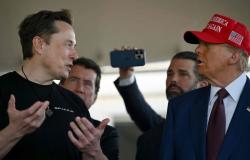The Americans postponed Donald Trump to the White House in particular in reaction to the high inflation of recent years. But if he keeps his election promises, his policies will only contribute to the problem.
“The major risk is that Trump keeps his campaign promises,” Harvard University economist Jason Furman said Wednesday in a column for the daily The World. Increased customs duties, war on immigrants, increase in public deficits, infringement of the independence of the American Federal Reserve are all dangers not only for other countries, but also for the American economy. Among other things with regard to the cost of living, noted, like him, several experts.
« [Re]hello inflation, we couldn’t get enough of you,” exclaimed Derek Holt, chief economist at Scotiabank, in an analysis of the impact of Tuesday’s US election.
The former and now future Republican president has, among other things, promised to impose trade tariffs of at least 60% on all imports of Chinese goods and 10% to 20% on imports from all other countries, Canada included. The low version of these tariffs alone would represent an additional bill of $1,700 per average American family per year, estimated the Peterson Institute for International Economics (PIIE).
As these tariffs are unlikely to attract retaliation from affected countries, and as supply chains are already struggling to adapt to regional conflicts, natural disasters and geopolitical tensions, it is necessary to expect inflation to increase by almost 1%, estimated a Morgan Stanley study cited Wednesday by the Wall Street Journal.
In addition to being a human nightmare, the hunt and mass expulsion of the approximately 8.3 million illegal immigrants currently on the American job market would take away the hands and brains that the American economy badly needs and would make more expensive remaining labor.
Donald Trump also intends to renew the tax cuts granted to businesses and households in 2017, in addition to adding new ones for businesses and no longer taxing tips, social assistance benefits and overtime. This renewal, as well as other small measures, should cost Washington a little less than 10,000 billion over the next 10 years, which will largely go to the debt since the new trade tariffs will only bring in 2,700 billion, according to the Committee for a Responsible for the Federal Budget.
As for Donald Trump’s promise to make “draconian” budget cuts, it will likely remain a dead letter, because it would force him to slash federal programs that Americans are far too attached to let him do, observed Derek Holt, and that the Republicans also intend to increase military spending.
We should also not expect Trump to abolish the very generous subsidies for technologies and the green transition of the Inflation Reduction Act (IRA), warned analyst Angelo Katsoras of the National Bank on Wednesday, because about three-quarters of the allocated funds went to Republican districts. We will probably only prefer to reduce them or redirect them towards other economic sectors.
This budgetary and fiscal profligacy would have the dual effect of stimulating demand and increasing the government’s debt, two inflationary factors. All this will force the US Federal Reserve to reduce interest rates less quickly and less significantly than it would have done otherwise, explained Douglas Porter, chief economist at the Bank of Montreal.
Canada in all this
The Canadian economy could first benefit from the re-election of Donald Trump, continued economists Jimmy Jean, Francis Généreux and Randall Bartlett, of Mouvement Desjardins. As in 2016, his arrival in power could begin with a period of optimism among American consumers, buoyed by promises of tax cuts and a reduction in uncertainty.
Deregulation in the energy sector could also “resurrect” the Keystone XL pipeline project, noted Douglas Porter. But trade tariffs and the withdrawal of American investors from their currency will not take long to weigh down the Canadian economy and the loonie. Canada also risks quickly being forced to reduce corporate taxes, increase its military spending and face an increase in the number of immigrants pushed towards its borders.
We asked ourselves the same questions and developed the same economic scenarios for the best and the worst in other countries on Wednesday, the day after the American presidential election. In China, where it is expected to be the center of attention and the wrath of the next Republican president, observers said that Beijing could well be forced to soon deploy the massive economic recovery plan to which it was still reluctant .
In total, however, it is the Americans themselves who would bear the brunt of the policies promised by Donald Trump, concluded PIIE researchers who compared the impact of a strong version (tariffs with retaliation, expulsion of 8, 3 million immigrants, reduced Fed independence) and that of a watered-down version (tariffs without retaliation, 1.3 million immigrants deported, reduced Fed independence). In some years, economic growth could be up to 10% lower and inflation 7% higher than they otherwise would have been.
Fog straight ahead
The rules and political checks and balances being what they are in the United States, it will take time for Donald Trump to deploy all his electoral promises, even if he controls all the levers of power in Washington, warned Angelo Katsoras. It is not impossible that in the meantime, it will be forced to lower some of them, or that it will be discovered, for example, that its commercial rates were mainly intended to serve as means of pressure to obtain from others concessions.
But it is also possible that Donald Trump will resort to even more severe and unpredictable policies, recalled Ben May of the firm Oxford Economics.
“America made its choice and the world will now have to live with its consequences,” concludes Derek Holt.
With Clémence Pavic






